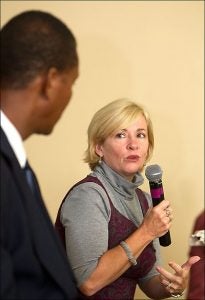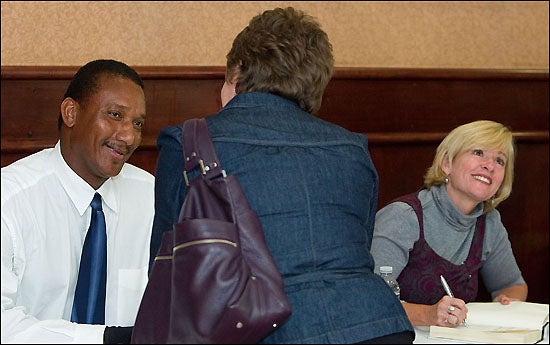“Picking Cotton” authors visit campus, discuss forgiveness
Jennifer Thompson and Ron Cotton bantered back and forth answering questions from East Carolina University students Wednesday afternoon. Their ease with each other now doesn’t convey the years of turmoil each lived through to get to this point.
Their individual and combined journey to forgiveness and freedom from a violent attack in 1984 is chronicled in their New York Times bestseller, “Picking Cotton: Our Memoir of Injustice and Redemption.” Their visit to campus Oct. 4 capped weeks of discussion of the book; it was the Pirate Summer Read for incoming first-year students.
“Picking Cotton” chronicles how two people’s lives became intertwined through a case of misidentification and a prison sentence that followed.
Thompson was a 22-year-old Elon College student, excited about living on her own, when she was raped at knifepoint in July 1984 in her small off-campus apartment.
Cotton was a high school dropout who was picked up by the Burlington Police Department and identified by Thompson as her assailant – multiple times. He was found guilty and sentenced to life plus 50 years. After serving 11 years in prison, Cotton was released after DNA evidence proved the attacker was Bobby Poole, who looked so much like Cotton that fellow inmates and prison guards at Central Prison in Raleigh confused the two.
Cotton was the first post-conviction prisoner in North Carolina exonerated through DNA evidence; he was the 23rd nationally. Today, 260 people have had their convictions overturned by DNA evidence, Thompson said.
Thompson and Cotton now travel the country speaking about the need for judicial reform. In recent years, they have spoken in Georgia at rallies calling attention to Troy Davis, who was convicted of killing an off-duty Savannah, Ga., police officer in 1989. He was executed on Sept. 21.

Cotton and Thompson shared their experiences at a presentation on the ECU campus.
“For me the importance of speaking on a college campus is about creating a dialogue,” Thompson said.
“Because it’s your group that will really need to create a dialogue about racism, sexual violence, making good choices, what do you do when the journey becomes a different journey than you planned, how do you keep moving forward?”
Today, Thompson and Cotton give about 75 speeches each year along with multiple media interviews. Thompson is a member of the North Carolina Actual Innocence Commission. Her triplets, Brittany, Morgan and Blake, are now 21 years old and in college themselves, including one who attends Elon. And she remarried last weekend to a University of North Carolina professor.
She joked that they were on their honeymoon in “Pirate Land.” She and Cotton danced to “Lean on Me” by Bill Withers at the wedding reception.
Wearing a wrist-support and walking with a cane to keep him steady, Cotton is recovering from a stroke he had in July. He and his wife have a 13-year-old daughter Raven, whom he mentioned more than once is an A-honor roll student.
Forgiveness
In 1997, Thompson decided to participate in “What Jennifer Saw,” a PBS Frontline documentary focusing on failed memory and eyewitness errors in crimes and how DNA can factor in setting innocent prisoners free.
At first, Thompson said no to the project, but the producers told her that Cotton had agreed to tell his side of the story. She thought about it and agreed but only if they didn’t have to see each other during the filming.
“So that’s what we did. He did his part; I did my part; and then the piece aired in February 1997,” Thompson said. “And when I saw it, I realized I was really, really stuck. I wasn’t moving forward. I was still very, very damaged. And the only way I knew I could go forward was to meet Ronald. So when I met him that’s when the story really evolved into our relationship today.”
Cotton said he had wanted to meet Thompson after he was released from prison but he waited for her to be ready – for two years. They met in the campus minister’s office in the church on Elon University’s campus with Cotton’s wife, Thompson’s husband and others gathered in the chaplain’s office, Cotton said.
“My wife and I walked into this room where she was waiting, and she looked up at me, and said, ‘Ronald, or Ron I’m not sure what to call you, but I can’t begin to tell you how sorry I am for what happened’,” Cotton said.
“And I said, ‘Look, Jennifer, you don’t have to worry about that because I forgave you years ago. I don’t want to be the one making you look over your shoulder and worry about me being there to do harm to you or your family because all I want is peace and understanding….’ I saw the serenity in her eyes. She cried. I cried…. We discovered a great bond that day, and from that day forward we’ve come together,” he said.
“It was difficult for me to move forward with the hate that I held inside and the grudges. I had to let it go and put it in God’s hands. That gave me the courage to move forward,” Cotton said.
Coming forward
A female student asked Thompson about coming forward to press charges after she was raped and what she would say to rape victims who are scared to come forward.
“Every two minutes in the United States, a woman is raped. That’s just a fact. We also know that 67 percent of those women will be raped by someone that they know,” Thompson said. “The odds are if a woman is sexually violated it will be someone that she knows and potentially a family member.”
For a woman raped by a stranger, it’s not as difficult to report as when a woman is raped by a boyfriend or a member of her family because then she often worries people might not believe her, Thompson said.
“Rape is such an underreported crime because we usually know our perpetrator and our rapist,” she said, noting she was at a school last week speaking to two students, a male and a female, who had both been raped by their fathers. “And both of those men had served time in jail,” she said. “I encourage everyone to report it if it happens because rapists don’t rape one time. So it’s important to hold these people accountable.”
Thompson added: “Report it and then go and get help. I didn’t go get therapy. I didn’t get counseling. And I should have.”
Crime and Punishment
Thompson said she supported the death penalty until 2000, when she went and did work for the Gary Graham case in Texas. “That’s when I realized that we have innocent people on death row. And if we have innocent people on death row, then we’ve executed innocent people,” she said.
“Even though we are finding them on death row and are exonerating them, we’re still executing innocent people. And two weeks ago was a prime example with Troy Davis,” she said.

“Picking Cotton,” the Pirate Read for incoming ECU freshmen, tells the story of how Cotton and Thompson’s lives were intertwined through a case of misidentification.
“So after working on Gary Graham’s case and realizing this guy was innocent and we executed him anyway, I started to challenge myself on why was I supporting the death penalty. Does it fix anything? Does it work?”
Thompson and Cotton have been working for the past 11 years to abolish the death penalty, she said.
“Innocent people have been in prison for thousands of years and will continue to be in prison because human beings run the system. And human beings aren’t perfect and we make mistakes,” Thompson said.
What can help? One answer, Thompson said, is putting best practices in place. “North Carolina is one of three states with all police departments following procedures to collect victim witnesses’ memory without contaminating it. It reduces the chance of getting someone innocent so we can continue to look for the person who is guilty,” she said.
She also pointed out the North Carolina Innocence Inquiry Commission, a three-judge panel that holds full judicial power to investigate and evaluate post-conviction claims of factual innocence. It is the only panel of its kind in the United States.
On campus
“I was raped when I was your age,” Thompson said to the ECU students. “I had lots and lots of ambitions going into college. My journey was well planned down to the minor details. And then life changed in a half-hour. My life was a disaster,” Thompson said.
The life the students think they have planned now might not pan out. “You might not graduate top of your class or marry your boyfriend,” she said. “You might get hurt or damaged in a way. But those are all opportunities to either spiral down or spiral up.
“It took me 49 years to really understand that I don’t have to give my power or another minute of my life to anger or pain. At any time I could decide different. Life isn’t always going to work out like you think; it just can’t. But you always have a chance to choose happiness, joy and peace. So I challenge you to do that.”
Cotton urged the students to not get involved in drugs and alcohol, saying he had seen the effects on people around him. “You are here for an education, not drugs. So if you’re on that road, wake up and smell the coffee,” he said.
During their afternoon sessions Thompson and Cotton seemed to connect with the students, ranging from Teaching Fellows and Honors College students to a session for English students.
“At first it was really hard for me to read it because some of my family members have gone through something like that,” said freshman Julia Hurley.
“My instinct would be different from hers when she said she just let it happen. But once I got past that point, I just kept reading it and reading it. I couldn’t put it down,” she said.
“It meant so much to this area and I’m from Michigan so I had a completely different perspective. At first I only took in racism and all this anger, but when I read it again I kept seeing little things like how he was able to let go. It just hit me how close they are now,” she said.
One student, Collena Robertson from Charlotte, didn’t connect with the book. “I thought it was a fairy tale. The way the book was written that they are friends, the rape, he goes to her kid’s soccer game, now they are together, it was mind-blowing,” she said. “It just seems easy. Maybe it was the way the book was written.”
For David Williams from Wilkes County, the story was different than for some of his classmates since he’s African-American. “I thought it was inspirational and it was a good story. Some parts made me angry because there was racial injustice and they only saw a black face,” he said.
Jessica Huffines saw her hometown in print. “I put myself in the places they were at since I’m from Burlington. When they were talking about these places, I could see what was there and I know what it was like. It impacted me a lot because you don’t think that can happen in your small town,” she said.
# # #
